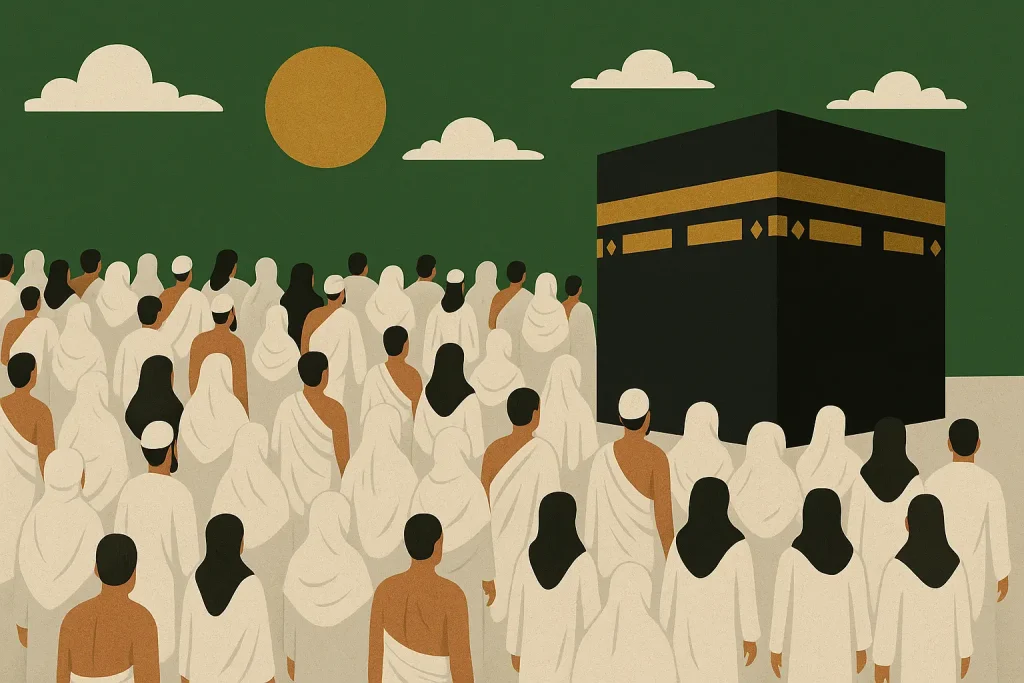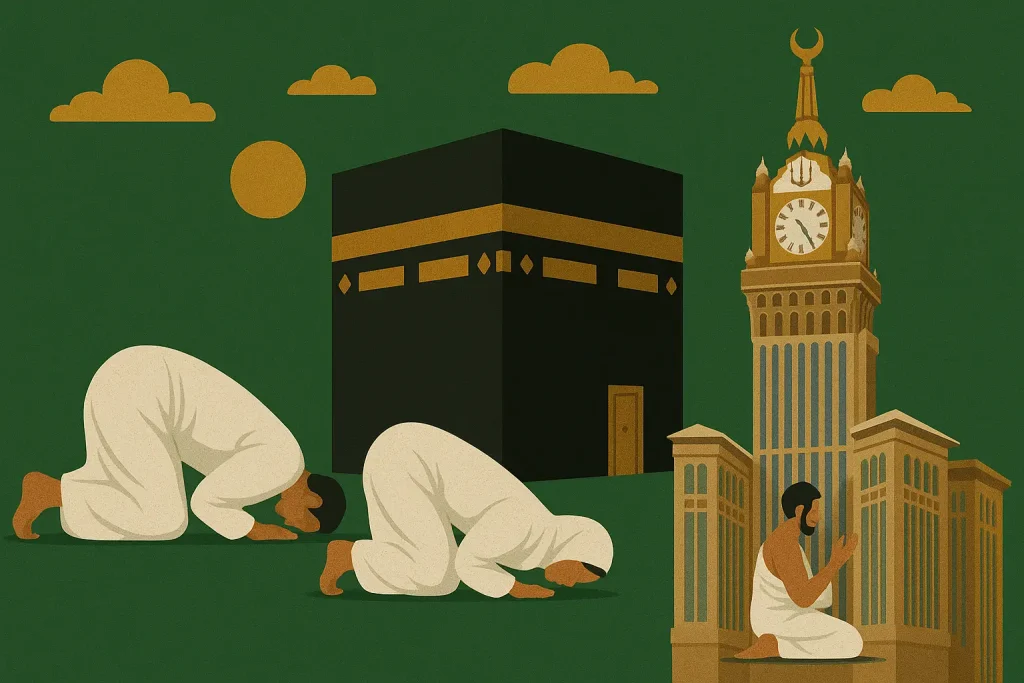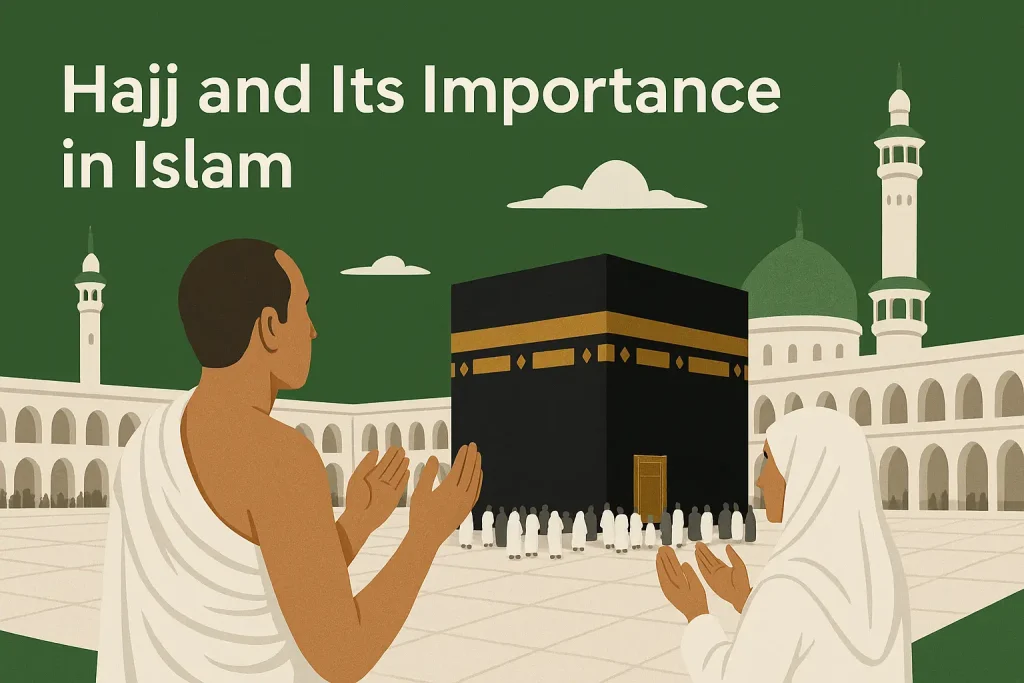What Is Hajj In Islam?
Hajj is the fifth and last pillar of Islam and Muslims must undertake once in their lifetime if they are physically and financially able to perform it. Hajj takes place only once in a year in the month of Dhul-Hijjah in the holy city of Makkah in Saudi Arabia.
Hajj commemorates the trials and devotion of Prophet Ibrahim (AS), his wife Hajira (AS), and his son Ismail (AS). Muslims must follow the rituals that symbolize sacrifice and submission to Allah.
In the Quran, Allah says:
“And Hajj to the House (Kaaba) is a duty that mankind owes to Allah, for those who can afford the journey…”
(Surah Aal-e-Imran 3:97)
Why Is Hajj Important in Islam?
Understanding the Hajj importance requries looking at its personal impact and social impact. Hajj symbolizes unity among Muslims because millions of Muslims gather from different countries together and wear same white dress by erasing all status like nationality, wealth and status etc.
Prophet Muhammad (PBUH) said:
“Whoever performs Hajj for Allah’s pleasure and avoids all sinful acts… will return after Hajj free from all sins as if he were born anew.”
(Sahih Bukhari, Hadith 1521)
This hadith shows the importance of Hajj as a form of complete spiritual renewal. It reminds believers of the Day of Judgment when all will stand before Allah in equality and humility.
What is the purpose of the Hajj?
The purpose of the Hajj is deeply rooted in spiritual growth, obedience, and remembrance. Each ritual during Hajj has a purpose:
- Tawaf (circling the Kaaba) shows unity in worship.
- Sa’i (walking between Safa and Marwah) honors Hajar’s search for water.
- Standing at Arafat symbolizes the climax of the Hajj, where Muslims seek forgiveness.
Hajj trains the Muslims in patience and submission to Allah’s command. Allah says inthe Quran:
“So that they may witness benefits for themselves and mention the name of Allah…”
(Surah Al-Hajj 22:28)
Why Do Muslims Go On Hajj?
Hajj is the fifth and last pillar of Islam, and it’s a direct command from Allah to perform the Hajj. It’s not only a tradition but but a religious obligation for every capable Muslim.
Hajj reminds the Muslims about the sacrifices made my Prophet Ibrahim (AS) who was even ready to sacrifice his son for Allah. So, when someone asked, Why Muslims go on Hajj? The answer is simple: Earn Allah’s mercy, connect with legacy of their Propets and fulfill divine command.

How to prepare for Hajj?
Spiritual Preparation:
- Sincere repentance (Tawbah)
- Paying off debts and seeking forgiveness from others
- Learning the rulings (Fiqh) of Hajj
Physical Preparation:
- Building stamina for walking long distances
- Vaccinations and health checkups
Financial Preparation:
- Ensuring halal earnings
- Saving enough for the journey and the family’s needs during the absence
Mental Preparation:
- Patience is key — large crowds and long waits are part of the experience
- Expect emotional moments; Hajj is life-changing

How to perform Hajj?
- Ihram: Wearing two white garments for men; modest dress for women
- Tawaf: Circling the Kaaba seven times
- Sa’i: Walking between the hills of Safa and Marwah
- Standing at Arafat (Wuquf): Prayers and reflection from noon till sunset
- Muzdalifah: Collecting pebbles for the next day’s ritual
- Stoning the Jamarat (Ramy): Throwing stones at pillars that represent Satan’s temptation
- Animal Sacrifice (Qurbani): Following the example of Prophet Ibrahim (AS)
- Shaving/Cutting Hair (Halq/Taqsir): Symbolizes a new beginning
- Farewell Tawaf (Tawaf al-Wida): Final circumambulation of the Kaaba
Each step has deep spiritual meaning, reminding pilgrims of submission, struggle, and renewal.
Conclusion
Hajj is one of the most sacred duties in Islam, a command from Allah and a chance for Muslims to cleanse their soul. The importance of Hajj lies not just in fulfilling a religious obligation, but in embodying the essence of Islam.

